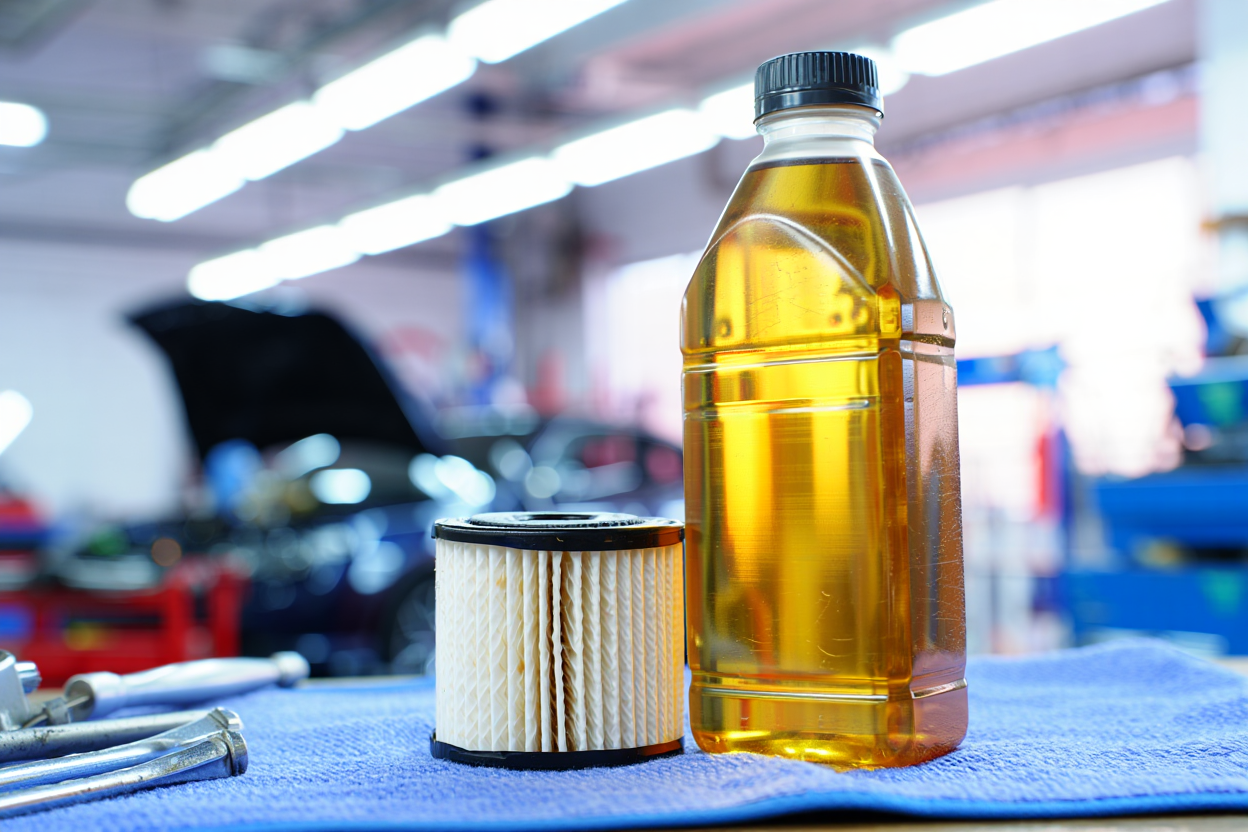If the engine is the heart of your Toyota Corolla, then oil is its lifeblood. Every moving part inside your engine—from pistons to camshafts—relies on a steady flow of clean oil for lubrication, cooling, and protection.
The oil filter plays an equally important role by trapping contaminants such as dirt, carbon deposits, and microscopic metal shavings that naturally form as the engine runs. While Toyota provides recommended intervals in the owner’s manual, the reality is that driving habits, environment, and the type of oil used all impact how long your oil can last.
In this detailed guide, I’ll break it all down—Toyota’s official recommendations, technical factors that affect oil life, real-world cost expectations, mistakes to avoid, and practical tips.
Why Regular Oil and Filter Changes Matter?
Oil changes are more than routine maintenance—they’re essential for performance, fuel economy, and engine longevity.
Engine Protection and Performance
When fresh, oil forms a protective film that prevents direct metal-to-metal contact inside your engine. Over time, oil degrades due to heat, friction, and contamination. It becomes thinner, less effective, and unable to protect critical components like pistons, crankshafts, and valve trains.
Skipping oil changes accelerates wear, increasing the risk of blown gaskets, seized pistons, or even total engine failure.
Fuel Economy Benefits
Old, dirty oil forces your engine to work harder. This increases internal resistance, lowering fuel economy. In a car like the Corolla—known for efficiency—neglecting oil changes can mean the difference between 32 MPG and 26 MPG over time.
Long-Term Cost Savings
An oil change may cost $50–$100, but ignoring it could lead to a $3,000–$5,000 bill for engine replacement. Think of it as insurance: a small recurring investment to prevent catastrophic expenses later.
Toyota’s Official Oil Change Recommendations
Toyota recommends intervals based on oil type, with newer Corollas using synthetic oil requiring fewer changes.
Conventional Oil Intervals
For older Toyota Corollas (generally 2008 and earlier), Toyota recommends oil changes every 5,000 miles or 6 months. These models often ran on conventional or blended oils, which degrade faster under heat and pressure.
Synthetic Oil Intervals
Most newer Corollas (2010 and later) are designed for full synthetic oil. Toyota states that synthetic oil can last up to 10,000 miles or 12 months, provided you drive under “normal” conditions.
Example: A 2020 Corolla with a 2.0L Dynamic Force engine officially requires 0W-20 full synthetic oil and can go 10,000 miles between oil changes.
Oil Filter Replacement
Toyota’s service manuals emphasize replacing the oil filter every time you change the oil. An old filter left in place will immediately contaminate your fresh oil, reducing its effectiveness.
Factors That Affect Oil Change Frequency

Real-world conditions often shorten Toyota’s recommended intervals.
Driving Habits
- Short trips under 5 miles: The engine never reaches optimal temperature, leaving condensation and fuel residue in the oil.
- Aggressive driving: Frequent acceleration, high RPMs, and hard braking increase engine stress.
- Stop-and-go traffic: Common in cities, leads to faster oil breakdown compared to steady highway cruising.
Climate and Environment
- Hot climates (e.g., Texas, Arizona): Oil thins faster, losing protective viscosity.
- Cold climates (e.g., Minnesota, Canada): Thick oil struggles to flow during startups, stressing components.
- Dusty environments (e.g., rural dirt roads): Particles enter the system more easily, clogging the filter and contaminating oil.
Corolla Model Year and Engine Design
- 2000–2008 Corollas (1.8L 1ZZ-FE engines): Built for conventional oil, requiring frequent changes.
- 2009–2019 Corollas (1.8L 2ZR-FE engines): Transition models, compatible with synthetic blends or full synthetic.
- 2020–present Corollas (2.0L M20A-FKS Dynamic Force engines): Optimized for synthetic oil with extended intervals.
How to Tell When It’s Time for an Oil Change?
Don’t rely only on mileage—use these signs to stay ahead of problems.
Dashboard Warning Lights
Newer Corollas have an oil change reminder system. When it lights up, it means the car has tracked enough mileage or time since your last service.
Oil Color and Texture
- Healthy oil: Amber or light brown, semi-transparent.
- Old oil: Dark, gritty, and thick. Wipe your dipstick on a paper towel—if it smears black, it’s overdue.
Engine Noise or Knocking
Insufficient lubrication leads to tapping, ticking, or knocking sounds as metal parts grind against each other.
Burning Smell or Smoke
Overdue oil can burn, producing a sharp odor inside the cabin or visible blue-gray exhaust smoke.
Cost of Oil and Filter Changes for a Toyota Corolla
Expect $40–$120 per change, depending on oil type and service choice.
Typical Service Costs
- Conventional oil change: $40–$60
- Synthetic oil change: $70–$120
- DIY oil change: $25–$50 (oil + filter from an auto parts store)
OEM vs. Aftermarket Filters
- OEM Toyota filters: $10–$15, designed for proper fit and durability.
- Aftermarket filters: $5–$12, cheaper but quality varies—some don’t meet Toyota’s standards.
Labor Costs
Shops charge an additional $20–$50 for labor, though dealerships may offer free oil changes during warranty.
Common Mistakes Corolla Owners Make
Avoid these pitfalls that can shorten your engine’s life.
- Waiting for the oil light: The warning light means oil is already dangerously low.
- Using the wrong viscosity: Toyota typically recommends 0W-20 synthetic for newer Corollas. Using 10W-40 may cause sluggish performance.
- Skipping the filter: Replacing only the oil leaves contaminants behind.
- Mixing oils: Blending synthetic with conventional dilutes performance.
- Relying on “quick lube” shops: Some use low-quality filters or bulk oils that don’t meet Toyota standards.
Practical Tips to Extend Oil and Filter Life
Smart maintenance habits improve performance and save money.
- Always follow Toyota’s recommended viscosity (e.g., 0W-20 for 2010+ models).
- Check oil monthly: Use the dipstick to monitor level and clarity.
- Warm up in cold weather: Letting the engine idle 30–60 seconds prevents strain.
- Drive regularly: Cars that sit unused accumulate condensation in oil.
- Adjust intervals for severe conditions: If you drive in stop-and-go traffic or dusty environments, change oil every 5,000–7,500 miles, even with synthetic.
Conclusion
Regular oil and filter changes are the single most important maintenance task for keeping your Toyota Corolla running reliably. While Toyota’s guidelines say every 5,000 miles for conventional oil and up to 10,000 miles for synthetic oil, your actual interval depends on driving habits, climate, and vehicle age.
By watching for warning signs, using the correct oil viscosity, and always replacing the filter, you’ll maximize your Corolla’s efficiency and lifespan. For many owners, sticking to a 7,500-mile oil change cycle with synthetic oil is a safe balance between cost and protection.
FAQs
How often should I change oil in a Corolla?
Every 5,000 miles for conventional oil or up to 10,000 miles for synthetic oil, depending on driving conditions.
Do I need to replace the filter every time?
Yes. An old filter contaminates new oil, reducing its lifespan.
Can I switch to synthetic oil?
Yes, Corollas can transition to synthetic at any time. Just don’t switch back and forth.
How do I know what oil my Corolla needs?
Check the owner’s manual. Most 2010+ Corollas use 0W-20 synthetic.
How much does a Corolla oil change cost?
$40–$60 for conventional, $70–$120 for synthetic. DIY changes can be as low as $25.
What happens if I delay an oil change?
Oil thickens into sludge, engine wear accelerates, and you risk expensive damage.
Will aftermarket filters void my warranty?
Not automatically, but Toyota may deny claims if a low-quality filter caused damage. OEM filters are safest.

Benjamin Grey is an automotive engineer and writer at Car Parts Advisor. With years of experience in the automotive industry, he shares expert advice on car parts, maintenance, and repairs to help car owners keep their vehicles running smoothly.





